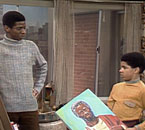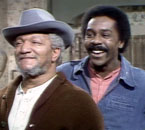Ghetto comedies of the 1970s offered mainstream audiences a humorous view of working-class African American inner-city life, whether from the vantage point of a barbershop, a housing project, or a junkyard. Despite their commitment to African American performers and writers, the shows’ image of black life was often as unrealistic and equivocal as Julia’s.
These situation comedies equated the black experience with poverty, ignoring a growing black middle class. The “ghetto” they depicted was mostly a benign fantasy—a happy-go-lucky place where the effects of indigence and racism barely registered. They also reverted to stereotypes that drew protests from activists and viewers who saw them as out of step with the goals and achievements of the civil rights movement.
Image Credits/Captions (Click on thumbnails for full image)
TV Stills: Good Times, CBS, c. 1974; Sanford and Son, c. 1972

